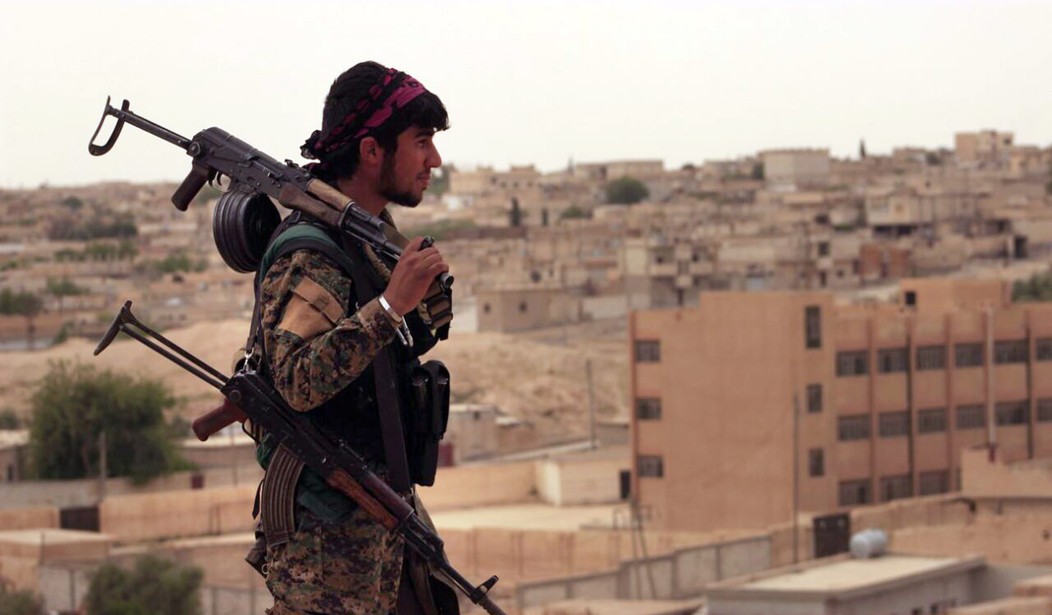WASHINGTON — Democratic Sens. Tim Kaine (Virginia) and Chris Coons (Delaware) offered the administration guarded praise Thursday for coalition victories against ISIS in Syria and Iraq during a hearing in which a U.S. ambassador warned that caliphate leadership remains a threat.
Local and U.S.-led coalition forces claim that 98 percent of territory controlled by ISIS in Syria and Iraq has been recaptured over the past two years. According to the BBC, some 10 million Syrian civilians — about half the country’s population — lived in ISIS-controlled areas at the caliphate’s height.
Partner forces backed by Operation Inherent Resolve scored significant victories against the caliphate in October. The Iraqi Security Forces with U.S. support liberated Mosul that month, while Syrian Democratic Forces captured Raqqa, the northern Syrian city regarded as the operational headquarters of the caliphate. Just after the fall of Raqqa, ISIS was driven from the eastern Syrian town of Al-Bukamal, which was considered the caliphate’s last remaining stronghold in Syria.
“It is a good thing for us to sort of step back and celebrate the sort of battlefield successes of U.S. military and coalition partners against ISIS, and I do view that as somewhat seamless between the two administrations, with continuity of military leadership, continuity of the basics on the battlefield plan,” Kaine said during a Senate Foreign Relations Committee hearing. The Trump administration retained Brett McGurk, the Obama administration’s special presidential envoy for the global coalition to counter ISIS.
Coons said that while the fight against ISIS has “gone extremely well,” he criticized the administration for not fully utilizing new sanctions against Russia, which has supported the Assad regime in the Syrian civil conflict. There have been designations against Russia, Coons said, but he hopes there will be more.
Syria has been in civil conflict for more than six years, following the Arab Spring and the Assad regime’s killing hundreds of demonstrators, which helped inspire the formation of the Free Syrian Army. The conflict has resulted in more than 465,000 Syrian deaths and the displacement of some 12 million citizens.
“You see the map of the ISIS territory held two years ago at this time and what it is today, and it’s great news that ISIS’ territorial control has rapidly eroded over the last year under this administration,” Sen. Marco Rubio (R-Fla.) said. “Here’s the bad news: It hasn’t been replaced by things that aren’t much better.”
The Florida lawmaker noted that al-Qaeda affiliates and Iranian-backed Hezbollah agents both have a vibrant presence in Syria, and Assad’s forces have been repeatedly reinvigorated.
Sen. Jim Risch (R-Idaho) said that ISIS allowed the U.S. a clear objective in Syria, and that objective has been taken care of, but he asked a State Department witness where the caliphate is expected to “rear its ugly head” in the future.
Ambassador David Satterfield, who serves as acting assistant secretary for the Bureau of Near Eastern Affairs, said that core ISIS leadership avoided key battles in Northern Iraq and Syria.
“They remain present, and they remain coherent,” Satterfield said, noting that ISIS has since attempted to reassert itself in Northern Iraq and Northern and Central Syria. He added that just a few weeks ago, six small towns along the Middle Euphrates River Valley were retaken from pro-regime forces by ISIS elements. “This fight is not over, and I’m speaking about the real combat fight here. We are convinced that with time, they can indeed be enduringly defeated, to use that rubric, which I think is quite appropriate, but not yet.”
Satterfield also discussed the international community’s estimates for rebuilding Syria — between $200 billion and $300 billion — following a potential resolution. He said that Syria and Russia do not have the resources to provide that assistance, and the international community is not going to fund the effort until there is constitutional reform in Syria that results in UN-supervised elections.
Coons voiced concern that the administration plans to remove U.S. forces from the conflict, given the significant victories against ISIS. He said that he is “alarmed” that Iran has injected Hezbollah with Russian support in sustaining Assad.
“The president has committed as a matter of strategy that we will not leave Syria,” Satterfield said. “We are not going to declare victory and go. That is not my opinion. That is the president’s strategic judgment. We’re going to stay for several reasons.”
Sen. Ben Cardin (D-Md.) noted that Congress and U.S. diplomats have emphasized the need to hold Assad accountable for his actions against his own people.
“That cannot be compromised in a final, political settlement. Are you still committed to that goal?” Cardin asked.
“We are, senator,” Satterfield replied.









Join the conversation as a VIP Member